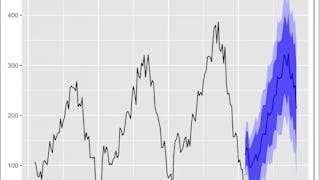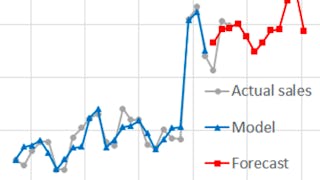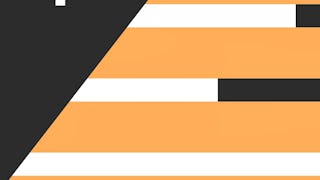Dieser Kurs ist der zweite in einer Specialization für Machine Learning for Supply Chain Fundamentals. In diesem Kurs erforschen wir alle Aspekte von Zeitreihen, insbesondere für die Vorhersage der Nachfrage. Wir beginnen damit, uns mit den grundlegenden Konzepten von Zeitreihen vertraut zu machen, darunter Stationarität, Trend (Drift), Zyklizität und Saisonalität. Dann werden wir einige Zeit damit verbringen, Korrelationsmethoden in Bezug auf Zeitreihen (Autokorrelation) zu analysieren. In der 2. Hälfte des Kurses werden wir uns auf Methoden zur Vorhersage der Nachfrage anhand von Zeitreihen konzentrieren, wie z.B. autoregressive Modelle. Zum Abschluss werden wir ein Projekt zur Vorhersage der Nachfrage mithilfe von ARIMA-Modellen in Python durchführen.



Nachfrageprognose mit Zeitreihen
Dieser Kurs ist Teil von Spezialisierung Maschinelles Lernen für Lieferketten


Dozenten: Rajvir Dua
3.707 bereits angemeldet
Bei  enthalten
enthalten
(33 Bewertungen)
Empfohlene Erfahrung
Was Sie lernen werden
Erstellen von ARIMA-Modellen in Python zur Vorhersage der Nachfrage
Entwicklung des Rahmens für fortgeschrittenere neuronale Netze (wie LSTMs) durch das Verständnis von Autokorrelation und autoregressiven Modellen.
Kompetenzen, die Sie erwerben
- Kategorie: Maschinelles Lernen
Wichtige Details

Zu Ihrem LinkedIn-Profil hinzufügen
5 Aufgaben
Erfahren Sie, wie Mitarbeiter führender Unternehmen gefragte Kompetenzen erwerben.

Erweitern Sie Ihre Fachkenntnisse
- Lernen Sie neue Konzepte von Branchenexperten
- Gewinnen Sie ein Grundverständnis bestimmter Themen oder Tools
- Erwerben Sie berufsrelevante Kompetenzen durch praktische Projekte
- Erwerben Sie ein Berufszertifikat zur Vorlage


Erwerben Sie ein Karrierezertifikat.
Fügen Sie diese Qualifikation zur Ihrem LinkedIn-Profil oder Ihrem Lebenslauf hinzu.
Teilen Sie es in den sozialen Medien und in Ihrer Leistungsbeurteilung.

In diesem Kurs gibt es 4 Module
In diesem Modul werden wir uns mit Zeitreihen in Python vertraut machen. Zunächst machen wir uns damit vertraut, wo Zeitreihen in die Landschaft des maschinellen Lernens passen. Dann lernen wir die wichtigsten Arten von Zeitreihen und ihre Unterscheidungsmerkmale kennen, darunter Zeitraum, Häufigkeit und Stationarität. Nach einer Pause, in der wir lernen, wie man Zeitreihen in Python darstellt, werden wir uns mit den Unterschieden zwischen Saisonalität und Zyklizität beschäftigen.
Das ist alles enthalten
7 Videos3 Lektüren2 Aufgaben1 Diskussionsthema
In diesem Modul werden wir uns mit den Ideen hinter Autokorrelation und Unabhängigkeit beschäftigen. Zunächst werden wir uns mit der Mathematik der Korrelation befassen und damit, wie sie zur Charakterisierung der Beziehung zwischen zwei Variablen verwendet werden kann. Als Nächstes werden wir die Beziehung zur Unabhängigkeit definieren und erklären, wo diese Ideen verwendet werden können. Schließlich werden wir die Korrelation mit Zeitreihenattributen wie Trend, Saisonalität und Stationarität kombinieren, um die Autokorrelation abzuleiten. Wir gehen sowohl auf die Theorie hinter der Autokorrelation ein als auch darauf, wie man sie in Python programmiert.
Das ist alles enthalten
8 Videos2 Lektüren2 Aufgaben1 Diskussionsthema
In diesem Modul werden wir zunächst einige der grundlegenden Konzepte der linearen Regression besprechen. Anschließend erweitern wir dieses Wissen um die verzögerte Regression, eine effektive Methode zur Anwendung von Regressionstechniken auf Zeitreihen. Sobald wir ein solides Fundament in der grundlegenden und verzögerten Regression haben, werden wir moderne Methoden wie ARIMA (autoregressiver integrierter gleitender Durchschnitt) erkunden. All dies bildet den Rahmen für fortgeschrittenere maschinelle Lernmodelle wie LSTMs (Long Short Memory Network).
Das ist alles enthalten
4 Videos1 Lektüre1 Aufgabe1 Programmieraufgabe1 Diskussionsthema1 Unbewertetes Labor
Im abschließenden Kursprojekt werden wir mit Hilfe von ARIMA-Modellen Nachfrageprognosen erstellen.
Das ist alles enthalten
1 Programmieraufgabe1 Unbewertetes Labor
Dozenten

von
Empfohlen, wenn Sie sich für Maschinelles Lernen interessieren


Coursera Project Network


Rutgers the State University of New Jersey


Macquarie University
Warum entscheiden sich Menschen für Coursera für ihre Karriere?




Bewertungen von Lernenden
33 Bewertungen
- 5 stars
50 %
- 4 stars
5,88 %
- 3 stars
8,82 %
- 2 stars
14,70 %
- 1 star
20,58 %
Zeigt 3 von 33 an
Geprüft am 12. Sep. 2022
Great course to gain fundemantals of Time Series Analyses for Demand Forecasting..

Neue Karrieremöglichkeiten mit Coursera Plus
Unbegrenzter Zugang zu 10,000+ Weltklasse-Kursen, praktischen Projekten und berufsqualifizierenden Zertifikatsprogrammen - alles in Ihrem Abonnement enthalten
Bringen Sie Ihre Karriere mit einem Online-Abschluss voran.
Erwerben Sie einen Abschluss von erstklassigen Universitäten – 100 % online
Schließen Sie sich mehr als 3.400 Unternehmen in aller Welt an, die sich für Coursera for Business entschieden haben.
Schulen Sie Ihre Mitarbeiter*innen, um sich in der digitalen Wirtschaft zu behaupten.
Häufig gestellte Fragen
Der Zugang zu Vorlesungen und Aufgaben hängt von der Art Ihrer Einschreibung ab. Wenn Sie einen Kurs im Prüfungsmodus belegen, können Sie die meisten Kursmaterialien kostenlos einsehen. Um auf benotete Aufgaben zuzugreifen und ein Zertifikat zu erwerben, müssen Sie die Zertifikatserfahrung während oder nach Ihrer Prüfung erwerben. Wenn Sie die Prüfungsoption nicht sehen:
Der Kurs bietet möglicherweise keine Prüfungsoption. Sie können stattdessen eine kostenlose Testversion ausprobieren oder finanzielle Unterstützung beantragen.
Der Kurs bietet möglicherweise stattdessen die Option 'Vollständiger Kurs, kein Zertifikat'. Mit dieser Option können Sie alle Kursmaterialien einsehen, die erforderlichen Bewertungen abgeben und eine Abschlussnote erhalten. Dies bedeutet auch, dass Sie kein Zertifikat erwerben können.
Wenn Sie sich für den Kurs einschreiben, erhalten Sie Zugang zu allen Kursen der Specializations, und Sie erhalten ein Zertifikat, wenn Sie die Arbeit abgeschlossen haben. Ihr elektronisches Zertifikat wird Ihrer Erfolgsseite hinzugefügt - von dort aus können Sie Ihr Zertifikat ausdrucken oder zu Ihrem LinkedIn-Profil hinzufügen. Wenn Sie die Kursinhalte nur lesen und ansehen möchten, können Sie den Kurs kostenlos besuchen.
Wenn Sie ein Abonnement abgeschlossen haben, erhalten Sie eine kostenlose 7-tägige Testphase, in der Sie kostenlos kündigen können. Danach gewähren wir keine Rückerstattung, aber Sie können Ihr Abonnement jederzeit kündigen. Siehe unsere vollständigen Rückerstattungsbedingungen.



